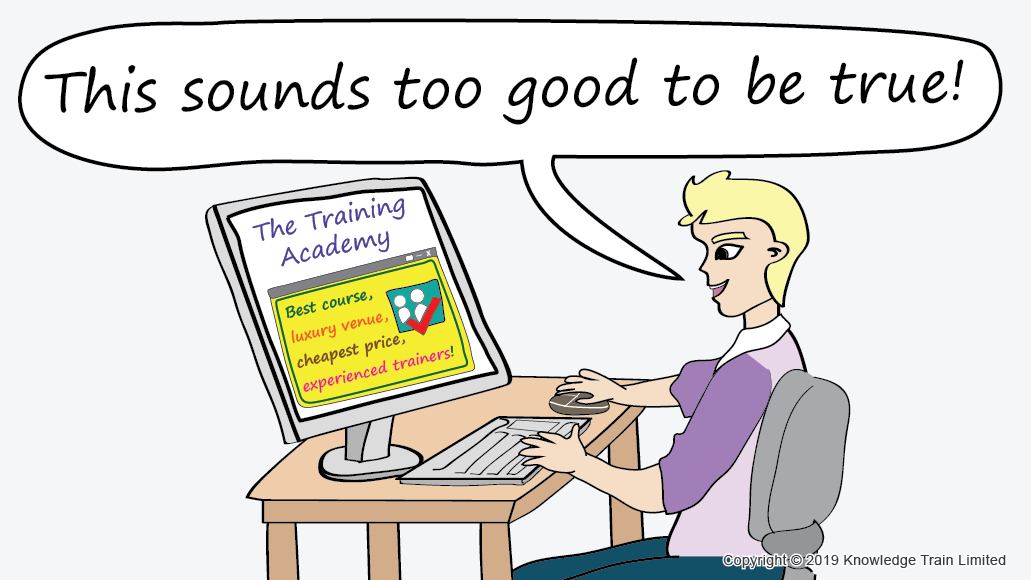
Introduction
Read on to discover how to find the best PRINCE2 training provider. Essential reading for any individual or organization currently trying to choose a provider.

Sales pitch
We’ve all seen the reviews: “Voted the Best PRINCE2 Course” “It’s official – we train more PRINCE2 students than any other!” ”100% Pass Rate for PRINCE2!” “Luxury location…” “FREE training materials. FREE PRINCE2 templates. FREE PRINCE2 manual.”
Of course, nothing is really free. It’s a sales pitch. And, more than likely, the training location is not luxury and the statistics have been fiddled. The past few years have seen an explosion of cheap PRINCE2 training providers, all sporting variations on these tag lines. Why is it that these remain effective, despite the fact that most prospective PRINCE2 students are fully aware of the illusory nature of sales strategies and marketing?
One reason is perhaps the difficulty of knowing the best way to select a PRINCE2 training provider. There are many factors involved, not immediately apparent to the PRINCE2 novice. The nature of PRINCE2 training means that there are a narrow range of end results for any PRINCE2 course (i.e., choosing PRINCE2 Foundation or PRINCE2 Practitioner), and most courses tend to be the same length. Thus, the only remaining variable seems to be cost, which can be strikingly different from one training provider to another.
The training experience matters
However, while cost may be the most obvious variable from the purchasing end, it is perhaps the least important from the perspective of the experience and effectiveness of the training. Understanding the PRINCE2 methodology and passing the PRINCE2 examinations is dependent upon a training experience that allows students sufficient time to absorb the material, to communicate with an experienced PRINCE2 trainer, and to discuss the PRINCE2 method in relation to their own project management situations.
All too often, cost-cutter training courses preclude these aspects of the PRINCE2 training experience. In order to offer students cheap courses, training providers cut back in four basic areas: materials, venue, time and trainers.
Materials
PRINCE2 is a comprehensive methodology, and it is vital that students have access to clear and reliable training materials, in order to grasp the ins and outs of each process, the interrelation of the management products, and the role each principle and theme plays in the overall framework.
Death by PowerPoint
Cheap training courses have a preference for PowerPoint, often printed six to a page. There are some PRINCE2 training providers who offer their students more than 360 PowerPoint slides in 3 days. Talk about death by PowerPoint!
Ask about the materials
When selecting a PRINCE2 course for yourself or your team, take a few minutes to enquire about, or peruse the training materials available: Are they printed, for example, in black and white or colour (a significant concern, given the quantity of PRINCE2 charts and diagrams)? Are training materials available online? What kind of pre-course materials are offered?
Need to be continuously improved
Less reputable training providers will not devote time to improving their course materials because they see this as a cost. If they can get away with using the same materials time after time, even though they aren’t effective, then they will do so.
Better training providers know how important the whole learning experience is, and take the time to improve their materials over time.
Venue
Avoid supermarket courses
Pile ’em high, sell ’em cheap—that’s the motto of a growing number of PRINCE2 training providers, and in today’s tight financial climate, the strategy has its successes. However, it also results in students crammed thirty to a room (yes, you read it right – more than thirty!), sharing desks, training materials, and sometimes even chairs. (I’m not kidding – these are all examples taken by students who have attended such courses with other providers, failed and then came to Knowledge Train to take another course with us).
The bigger the size, the lower the educational value
The problem with high class sizes means the higher the ratio of students to teacher, the less one-to-one communication is possible, and the harder it becomes for the student to grasp the course material. In other words, the more students in the class, the less the educational value (and comfort level) for each.
You need to be able to ask questions
This is starkly illustrated by the situations of some classrooms, in which students are barred from asking questions, as there are simply too many for any kind of interaction beyond the lecture theatre set-up. One student who came to Knowledge Train after failing their exam with another provider said the first thing the trainer told his students on the first morning was that “nobody could ask questions because otherwise I don’t have enough time to get through the materials”.
Time
Most PRINCE2 trainers will ask their students to study in advance of the course, and to complete a certain amount of homework and revision before their PRINCE2 exam. In cost-cutting training organizations, however, this can be taken to extremes.
Avoid huge amounts of time beforehand
With less time available in class to ask questions to the trainer, cheap training providers compensate for this by making their students spend more time preparing for the course in advance (often up to 15 hours) and more time doing homework.
While I wouldn’t want to prevent any keen student from going that extra mile, it is important to be aware, when choosing your PRINCE2 training, that such excessive extra study time is a clear indication that the classroom hours and environment are not sufficient to support a high success rate or effective PRINCE2 training.
Trainers
Good trainers cost money
One crucial way that cheap training providers use to save money is to employ inexperienced trainers. Those trainers just starting out in their training career are glad to get any work. The most experienced PRINCE2 trainers (and therefore more costly) can pick and choose who they work for.
By choosing the cheapest PRINCE2 training providers, it’s very likely that your trainer will be relatively inexperienced in delivering PRINCE2.
We’ve even heard of one academy bringing PRINCE2 trainers in from India to deliver courses in the UK. There’s no shortage of qualified, experienced PRINCE2 trainers in the UK, so they can only be doing this to save money.
Company size
Big is not better
Some companies like to tell you they are the largest provider. You know what large companies are often like – think of your mobile, or gas or electric provider. Good customer service? Probably not. It’s the same with training providers.
The sales staff trying to sell you a course cares nothing about you, or your career goals. They are only interested in their sales commission. That’s why they will try to sell you a course which might be totally unsuitable for you. That includes making all kinds of untrue claims simply because they want to close the sale.
Don’t be treated as a sales target
It’s generally the case that the larger the company, the less the individual customer is valued. You just become a number, a sales target, something to be shifted between departments as part of a system.
A smaller provider is much more likely to treat you as an individual, not as a potential sales target. The best providers will try to understand your training needs before offering you advice about which course (if any) would suit you.
Is the provider ethical?
You might think that all training organisations are ethical in the sense that they advertise a course, you pay for it, and then you attend and hopefully get accreditation at the end. Sounds simple doesn’t it?
However, there are some unethical training organizations who have no intention of ever running a course in a particular location. They advertise it however, will take your money but often don’t deliver.
The typical way this works is that the unethical provider will advertise the same course running in 5 or 6 cities in the same country all on the same date. They will then advertise the same course in the same cities the next month. They hope to get one or two people from each city and will then cancel all the courses except one and tell people from the other cities the location has changed and they must travel to the other city to attend the course, take their online learning instead, or lose their money.
Terms and conditions
Can you get your money back? The law is quite clear in the UK – you should be able to get a full refund if the company is not able to provide you with the goods or services which you have paid for. Read carefully the terms and conditions on the supplier’s website. You might be in for a nasty shock.
Unethical providers will keep your money and will make it extremely difficult for you to get a refund. Be clear what you are getting yourself into. If you do fall foul of abusive practices, contact your local trading standards office to make a complaint.
Tactics to help you
PRINCE2 training providers operate in a keen market place. This puts the potential PRINCE2 student in the position of selecting from a wide range of providers.
It is easy, for example, for training providers to fiddle their statistics (anyone can have a 100% pass rate, if you take into account only a few selected examinations), and to make the kinds of claims we considered at the beginning of this article. In this case, how can the new PRINCE2 student cut through the sales guff to choose the truly optimum course?
We’ve put together 12 questions to ask before buying a course in an article. By asking these questions you can save yourself a lot of money and disappointment later by choosing a reputable training provider.
Don’t just consider cost
Finally, do not be deceived by cost. A PRINCE 2 course several hundred pounds cheaper than the rest is likely to be lacking something crucial – good quality training materials, experienced trainers, training time, or training space, all essential components for an effective and fulfilling PRINCE2 training experience.
Don’t forget the old adage: “if it seems too good to be true, it probably is”.








